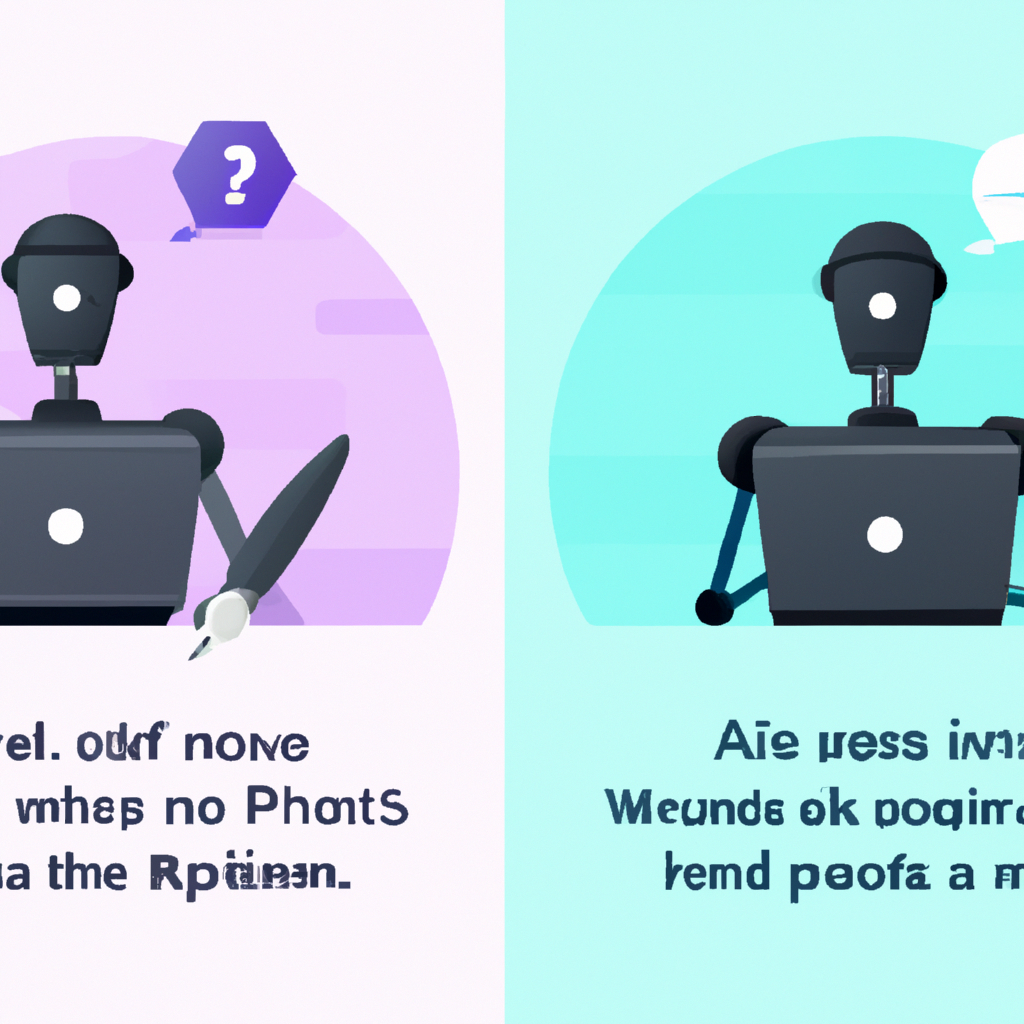-
Table of Contents
- Introduction
- Exploring the Benefits and Drawbacks of AI Writing Tools vs. Human Writers
- Comparing the Quality of Writing Produced by AI Writing Tools and Human Writers
- Examining the Cost-Effectiveness of AI Writing Tools vs. Human Writers
- Assessing the Accuracy and Reliability of AI Writing Tools vs. Human Writers
- Analyzing the Impact of AI Writing Tools on the Future of Writing and Publishing
- Conclusion
“Discover the power of AI Writing Tools and the creativity of Human Writers – the choice is yours!”
Introduction
Artificial Intelligence (AI) writing tools have become increasingly popular in recent years, offering a range of benefits to businesses and individuals alike. AI writing tools can help to automate mundane tasks, reduce costs, and increase efficiency. However, there are also some drawbacks to using AI writing tools, such as the potential for errors and the lack of creativity. In this article, we will explore the pros and cons of AI writing tools versus human writers, so that you can make an informed decision about which option is best for your needs.
Exploring the Benefits and Drawbacks of AI Writing Tools vs. Human Writers
When it comes to creating content, there are two main options: using AI writing tools or hiring a human writer. Each has its own benefits and drawbacks, so it’s important to understand the differences between the two before making a decision.
One of the main advantages of using AI writing tools is that they are much faster than human writers. AI tools can generate content quickly and accurately, allowing you to get your content out faster. Additionally, AI tools can be used to generate content in multiple languages, making them ideal for businesses that need to reach a global audience.
On the other hand, human writers have the advantage of being able to create content that is more personalized and tailored to the needs of the audience. Human writers can also provide more creative content that is more likely to engage readers. Additionally, human writers can provide feedback and make changes to content quickly, allowing for a more collaborative process.
When it comes to drawbacks, AI writing tools can be expensive and require a lot of maintenance. Additionally, AI tools can be limited in their ability to create content that is truly unique and engaging. Human writers, on the other hand, can be more expensive and require more time to produce content.
Ultimately, the decision of whether to use AI writing tools or human writers depends on the needs of the business. AI tools can be a great option for businesses that need to produce content quickly and accurately, while human writers can be a better choice for businesses that need more personalized and creative content.
Comparing the Quality of Writing Produced by AI Writing Tools and Human Writers
When it comes to comparing the quality of writing produced by AI writing tools and human writers, it is important to consider both the style and tone of the writing. AI writing tools are capable of producing informative writing with a friendly tone, but the quality of the writing may not be as good as that of a human writer.
AI writing tools are programmed to produce content that is accurate and grammatically correct. However, they lack the creativity and nuance that a human writer can bring to a piece of writing. AI writing tools are also limited in their ability to understand the context of a given topic, which can lead to writing that is overly general or lacks depth.
Human writers, on the other hand, are able to draw on their own experiences and knowledge to create content that is more engaging and meaningful. They are also able to use their understanding of the context of a topic to create writing that is more nuanced and specific. Human writers are also able to use their creativity to craft writing that is more interesting and engaging.
Overall, while AI writing tools can produce content that is accurate and grammatically correct, the quality of the writing is not likely to be as good as that of a human writer. Human writers are able to draw on their own experiences and knowledge to create content that is more engaging and meaningful.
Examining the Cost-Effectiveness of AI Writing Tools vs. Human Writers
Are you considering using AI writing tools to help you create content for your business? It’s an understandable choice, as AI tools can be cost-effective and efficient. But how do they compare to human writers when it comes to cost-effectiveness?
To answer this question, let’s take a look at the pros and cons of both AI writing tools and human writers.
AI Writing Tools
Pros: AI writing tools are generally more cost-effective than human writers. They can also be used to quickly generate content, which can be a great time-saver.
Cons: AI writing tools can be limited in their ability to create content that is engaging and creative. They also lack the human touch that can make content more relatable and interesting.
Human Writers
Pros: Human writers can create content that is more engaging and creative than AI writing tools. They can also provide a more personal touch to content, making it more relatable and interesting.
Cons: Human writers are generally more expensive than AI writing tools. They also require more time to create content, which can be a disadvantage if you need content quickly.
Overall, it’s important to consider both the pros and cons of AI writing tools and human writers when deciding which is more cost-effective for your business. While AI writing tools can be a great time-saver and cost-effective option, human writers can provide content that is more engaging and creative. Ultimately, the decision will depend on your specific needs and budget.
Assessing the Accuracy and Reliability of AI Writing Tools vs. Human Writers
AI writing tools have become increasingly popular in recent years, as they offer a convenient and cost-effective way to produce written content. But how accurate and reliable are these tools compared to human writers?
To assess the accuracy and reliability of AI writing tools, it is important to consider the quality of the output they produce. AI writing tools are designed to generate content that is grammatically correct and free of spelling and punctuation errors. However, they may not always produce content that is well-structured, engaging, or tailored to the intended audience.
In terms of reliability, AI writing tools can be used to produce content quickly and consistently. They can also be used to generate content on a wide range of topics, making them a useful tool for businesses that need to produce a large volume of content in a short amount of time.
However, AI writing tools cannot match the creativity and nuance of human writers. Human writers are able to draw on their experience and knowledge to produce content that is tailored to the intended audience and that conveys the desired message. They are also able to use their creativity to come up with unique ideas and perspectives that AI writing tools cannot replicate.
Overall, AI writing tools can be a useful tool for businesses that need to produce a large volume of content quickly and consistently. However, they cannot match the creativity and nuance of human writers, and should not be used as a substitute for professional writers.
Analyzing the Impact of AI Writing Tools on the Future of Writing and Publishing
The impact of artificial intelligence (AI) writing tools on the future of writing and publishing is an exciting and rapidly evolving topic. AI writing tools are becoming increasingly popular and are being used by writers, publishers, and other professionals in the writing and publishing industry.
AI writing tools are designed to help writers create content faster and more efficiently. They can help writers generate ideas, structure their writing, and even provide feedback on their work. AI writing tools can also help publishers identify trends in the writing and publishing industry, allowing them to better target their content and reach their desired audience.
The use of AI writing tools is also changing the way writers and publishers approach the writing and publishing process. AI writing tools can help writers create content faster and more efficiently, allowing them to focus more on the creative aspects of writing. AI writing tools can also help publishers identify trends in the writing and publishing industry, allowing them to better target their content and reach their desired audience.
The use of AI writing tools is also changing the way writers and publishers approach the writing and publishing process. AI writing tools can help writers create content faster and more efficiently, allowing them to focus more on the creative aspects of writing. AI writing tools can also help publishers identify trends in the writing and publishing industry, allowing them to better target their content and reach their desired audience.
The use of AI writing tools is also changing the way writers and publishers approach the writing and publishing process. AI writing tools can help writers create content faster and more efficiently, allowing them to focus more on the creative aspects of writing. AI writing tools can also help publishers identify trends in the writing and publishing industry, allowing them to better target their content and reach their desired audience.
Overall, the use of AI writing tools is revolutionizing the way writers and publishers approach the writing and publishing process. AI writing tools are making it easier for writers to create content faster and more efficiently, while also helping publishers identify trends in the writing and publishing industry. As AI writing tools continue to evolve, the future of writing and publishing looks brighter than ever.
Conclusion
Overall, AI writing tools and human writers both have their own advantages and disadvantages. AI writing tools can provide quick and accurate results, but they lack the creativity and personal touch that a human writer can provide. Human writers can provide a more personalized experience, but they may take longer to complete a task and may not be as accurate as an AI writing tool. Ultimately, the choice between AI writing tools and human writers depends on the specific needs of the project.



